|
|
|
Sort Order |
|
|
|
Items / Page
|
|
|
|
|
|
|
| Srl | Item |
| 1 |
ID:
168791
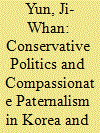

|
|
|
|
|
| Summary/Abstract |
It is widely predicted that East Asia’s conservative governments will lose political power for managing socioeconomic crises under neoliberal globalization and find no way out of their legitimacy problem. However, Korea’s and Japan’s conservative governments have recently constructed a new model of crisis management—compassionate paternalism—in a highly discretionary manner.
|
|
|
|
|
|
|
|
|
|
|
|
|
|
|
|
| 2 |
ID:
164804
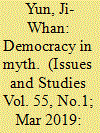

|
|
|
|
|
| Summary/Abstract |
After undergoing a series of mass demonstrations during the past three decades, including the 2016–2017 candlelight protests that led to the impeachment of President Park Geun-hye, many commentators in South Korea are confident that their country has become a land for what Karl Marx called “free men.” Korean citizens are portrayed as being ready to participate in voluntary political associations and collective actions and to pursue their interests in the public sphere. However, the data are showing the opposite to be true: citizen participation in public-sphere activities has substantially decreased since the mid-2000s, while the government has managed to improve or at least maintain its political responsiveness during the same period. Explaining the unnoticed background to this imbalance, this essay sheds light on the myth of the benefactor state in Korean democracy, arguing that this has emerged because neoliberalism has not only placed an increasing number of people in precarious positions but also neutralized them politically. The Korean government has capitalized on this situation to mythicize itself as a benefactor state that possesses an incomparable administrative capacity to take care of precarious people. By investigating the period of Park’s presidency (2013–2017) and the current rule of President Moon Jae-in (2017–), this essay shows how the myth of the benefactor state has emerged and created a unique cycle of Korean democracy.
|
|
|
|
|
|
|
|
|
|
|
|
|
|
|
|
| 3 |
ID:
088390


|
|
|
|
|
| Publication |
2009.
|
| Summary/Abstract |
This study provides a complement to the structural understandings of labor market polarization in South Korea by highlighting its policy-related aspects. It argues that there have been considerable policy failures by the Korean government, which have offset any possible positive effects of new redistributive and anti-poverty policy measures.
|
|
|
|
|
|
|
|
|
|
|
|
|
|
|
|
| 4 |
ID:
098455


|
|
|
|
|
| Publication |
2010.
|
| Summary/Abstract |
South Korea has long been regarded as a typical example of Confucian capitalism; the Confucian tradition of elderly support has not only been well preserved but is also highly conducive to economic growth by creating strong collective bonds between Koreans. Nonetheless, the existence of an unusually large elderly workforce and a disproportionately small young workforce, together with poor working conditions for both old and young workers, demonstrates that the assumptions of Confucian capitalism do not hold true in Korea. Explanations have conventionally attributed this problem to external factors that are unrelated to Korea's industrialization, such as increased life span, the changing quality of education and a shifting value system. This study, however, adopts a new approach that emphasizes the responsibilities of Korea's unique industrialization. It proposes that the main characteristics of Korea's development pattern have distorted the supply and demand structure of the country's labour markets and have caused the current demographic imbalance between the overworked elderly and the underworked youth. Specifically, this study suggests that two characteristics of Korea's industrialization-crony capitalism and growth absolutism-affect the behaviour of young and old workers, thereby preventing them from realizing the Confucian virtue of support for the elderly through labour markets. This study implies that the affinity between development and tradition is not automatically a given in East Asia but rather is dependent on how development is designed and implemented.
|
|
|
|
|
|
|
|
|
|
|
|
|
|
|
|
| 5 |
ID:
154853
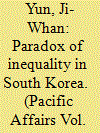

|
|
|
|
|
| Summary/Abstract |
Scholars have debated whether former South Korean President Park Geun-hye’s commitment to minsaeng kyŏngje (the economy for the people’s livelihood) was a reflection of the global rise in compassionate conservatism that attempted to address growing inequality or merely lip service to social policy. However, this debate has confined the issue to the social policy realm without explaining the paradox of inequality resulting from Park’s minsaeng drive. Although this drive allowed Park to exploit inequality for political gains, old policies of developmentalism increasingly returned to the forefront of her policy agenda. This article offers an alternative argument: that minsaeng kyŏngje was neither a sincere nor a false compassion, but a political discourse maneuvered by the Korean conservatives to reinvigorate old developmentalism in the face of inequality. The Park government first offered minsaeng kyŏngje as a catch-all discourse, which included the promotion of welfare policies and the traditional doctrine of economic development. Later, the government reinterpreted minsaeng as a subset goal of economic development. It scaled back welfare pledges and manipulated the minsaeng concept to legitimize development policies. By analyzing both the orientational and organizational characteristics of Korea’s developmental welfare state via manifesto analysis and word cloud testing, this article demonstrates how Korean conservatives made use of the norm of low taxation to avoid a systematic welfare increase and proposed an alternative minsaeng discourse by combining old developmentalism with a few welfare policies. The structure of a narrow power coalition enabled the Park government to maneuver the minsaeng discourse to fulfill its shifting policy priorities without coordination with other political actors.
|
|
|
|
|
|
|
|
|
|
|
|
|
|
|
|
| 6 |
ID:
177737
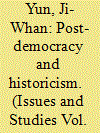

|
|
|
|
|
| Summary/Abstract |
Since Japan’s imposition of export controls against Korea in July 2019 and its following countermoves, including the termination of the General Security of Military Information Agreement, the governments of both countries have presented their own narratives of the origin of this trade war, both of which mirror theories of international politics. Nonetheless, these narratives mask several domestic origins. Most importantly, this paper demonstrates that behind the trade war, there has been a preoccupation of the two governments with mutually irreconcilable version forms of historicism. One is Korea’s pro-naturalist historicism, seeing Korean history as being preordained by the universal laws of human progress and defining Japan as a historical reactionary. The other is Japan’s anti-naturalist historicism, upholding internationalism as a new driving force of history that will transform Japan from a war criminal state into a proper subject in international society while criticizing Korea as being a drag on this transformation. This paper argues that, resulting from decades-long neoliberal politics that have disturbed the state-society balance, the national structure of post-democracy has encouraged each government to push historicism to its limit as an alternative source of political legitimacy in lieu of democratic accountability. Concretely, it shows that post-democracy has determined (1) the historicist framing of emerging conflicts, (2) the government’s legislative struggles to realize historicist policies, and (3) the incontestability of historicist hostility by other ideas in each country.
|
|
|
|
|
|
|
|
|
|
|
|
|
|
|
|
| 7 |
ID:
141145


|
|
|
|
|
| Summary/Abstract |
Referring to the short-term survival of new progressive governments, ‘progressive setback’ has been a remarkable political phenomenon in many East Asian countries during the recent decades. Regarding this phenomenon's background, this paper investigates why and how urban citizens challenged their progressive governments in Thailand, South Korea, and Japan. First, this paper argues that the progressive setback across East Asia reflects the difficulty progressive governments faced in overcoming the legacy of longstanding conservative regimes, which had locked urban citizens into specific modes of subsistence. The progressives invoked the protest of urban populations as their new socioeconomic policies undermined these populations’ traditional basis of subsistence. Second, an investigation of the primary modes of urban subsistence in each country makes the cross-national comparison of progressive setback possible. Urban middle classes in Thailand, as an exclusive group incorporated into the mainstream political economy, engaged in a fierce contest with a progressive government that denied their privileged status in Thai society. In Korea, the self-employed turned to the conservative party since market restructuring programs of the progressive government made it difficult for these self-employed to maintain profits and sustain their livelihood. Finally, Japan's urban workers could not welcome the welfare expansion of the new labor-friendly government, because this class was too dependent upon wage incomes to agree with the consumption tax hike that welfare expansion required as its precondition. This paper implies that the old habits of urban citizens are an important hurdle for East Asia's progressives to overcome.
|
|
|
|
|
|
|
|
|
|
|
|
|
|
|
|
| 8 |
ID:
126963
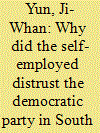

|
|
|
|
|
| Publication |
2013.
|
| Summary/Abstract |
Why did Korea's self-employed voters express their disapproval of the Democratic Party in the 2012 presidential election? This paper argues that this distrust was historically shaped. It originated from the failure of the former Democratic governments (1998-2007) in flexicurity reforms, which jeopardized the livelihoods of the self-employed.
|
|
|
|
|
|
|
|
|
|
|
|
|
|
|
|
|
|
|
|
|